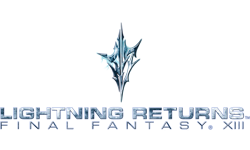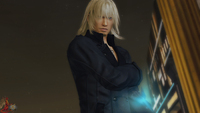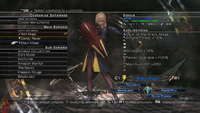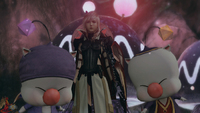|
|

|
PLATFORM
|
PS3
|
BATTLE SYSTEM
|

|
INTERACTION
|

|
ORIGINALITY
|

|
STORY
|

|
MUSIC & SOUND
|

|
VISUALS
|

|
CHALLENGE
|
Unbalanced
|
LENGTH
|
20-40 Hours
|
|
OVERALL

|
+ Combat and customization are refreshing
+ A handful of gorgeous locations to gawk at
- Frustrating lack of direction throughout
- Narrative is convoluted gibberish
- Characters are unlikeable and won't shut up
- Time mechanic actively diminishes enjoyment
|
Click here for scoring definitions
|
|
|
Lightning Returns: Final Fantasy XIII is an action role-playing game boasting an identity crisis coupled with a mean martyr complex, and that's a real shame as this final installment in the Final Fantasy XIII trilogy had the potential to finally turn things around. Once again, we return to a universe seemingly obsessed with Gods, Chaos, and an unreasonable amount of proper nouns. Lightning's determination is matched only by that of Square Enix to shove her down our throats. I would say that I missed Lightning and crew, but I struggle to remember the good times. It would appear the characters of this game have as well. Things are bleak in Lightning Returns, and just like the morning after a three-day bender, no one really seems happy to still be alive or completely sure of what they should be doing next. That is about the only thing I was able to relate to in this game.
The world of Lightning Returns, set five hundred years after the events of Final Fantasy XIII-2, is about to be scrapped. The Savior, the titular hero, wakes from her crystal stasis on the thirteenth day before God goes into his computer settings and completes a system restore. Lightning is informed over walkie-talkie by a young Hope Estheim that it is the Savior's role to shepherd the souls of humanity to a new world that will be created by Bhunivelze — a God that had only previously been mentioned in Final Fantasy XIII's hidden analects. To do this, she must complete quests such as gathering monster spoils, interrogating locals, finding random objects, and killing large creatures. Once quests have been completed, Lightning is rewarded with the spiritual energy retrieved when a person's burden is lifted. This is known as Eradia. At 6am each day, Lightning will be drawn back to the Ark, Hope's base of operations, where she will have to offer the collected Eradia to a giant tree called Yggdrasil. If enough Eradia has been gathered the in-game clock will be extended by one full day.
After Final Fantasy XIII-2's protagonists failed to stop Caius Ballad from unleashing all of the Chaos on the mortal world, a number of problems plagued what was once Gran Pulse. All human aging ceased and no new children are born due to Etro's death. The human population has decayed — as has Grand Pulse itself. In fact, all that is left of this once gigantic world is a set of islands known as Nova Chrysalia. In the quest to guide souls, Lightning will visit four regions, each dominated by a specific environment or mood. The checkerboard city of Luxerion is ultra-religious and basically analogous to the real world's Vatican City, the bright party city of Yusnaan is essentially Las Vegas, the Dead Dunes is a desert area covered in ruins, and the Wildlands are pretty self-explanatory. There will be much traversing between these lands, all the while wrestling with a time system that is neither nuanced nor particularly enjoyable.
Lightning is not entitled to thirteen days of saving souls in Lightning Returns. The timer starts out at seven days. Each in-game day only translates to one-hour of actual playtime. Those extra days are earned by saving souls, which is a problem as questing is anything but a straightforward process. Even with the aid of a thorough strategy guide, time will always be at odds with where Lightning should be. Many of the side-quests can only be obtained at exact times of day and only on certain days — which makes bouncing between locals in a timely manner challenging. The Chronostasis ability can stop time for just over a minute, but EP will be exhausted in doing so. That EP can be gathered from battles, but if there aren't many enemies around a quest might have to be ignored. Amazingly, Lightning Returns, an RPG, actually punishes the player for exploration. This system is frustrating for a few reasons, but the idiocy of limiting player time manipulation options to "temporarily pause" and "wait for new game plus" bears special mention.
 Everyone pouts too much.
Everyone pouts too much.
|
|
Speaking of things that are less fun, old acquaintances have returned. Well, somewhat. The charm characters like Sazh, Snow, and Fang once boasted is noticeably absent. It really takes the joy out of seeing them again, but they aren't the only joyless humans wandering around this crumbling world. NPCs are abundant in Lightning Returns, and they wouldn't be interesting even if they all simultaneously lit themselves on fire in one massive celebratory fiesta. No one feels real, and yet they all somehow seem more likeable than Lightning herself.
Lightning, seemingly chosen to be the Savior due to her inability to emote, approaches both friends and random NPCs alike in this game as though she were just sleepwalking. Her monotone nature may have worked in the past, but the robotic socializing that bookends each quest in this game is odd. Lightning is a black hole of likeability, and if that weren't apparent while tackling the main quest it would be while attempting any of the goofy JRPG side quests. Wacky humor and off-beat dialogue may be a staple of JRPG design, but here it not only sticks out next to the oatmeal main character — it runs sharply against the very serious tone of the game itself. People are dying, the world of Nova Chrysalia is ending, and Lightning is saying "meow-meow, choco-chow" with a stuffed moogle attached to her forehead.
Lightning Returns also suffers from difficulty spikes not seen since The Last Remnant. Initially, the player can choose from two difficulty settings, easy and normal, though the game highly recommends you start on easy. Even on easy mode some of the three-star quests and monster encounters feel a bit too harsh, almost as though they weren't designed to be fought by anyone other than the most well equipped, experienced players. There are also additional penalties in normal mode; escaping from battle can cost an entire hour of time and health can't be replenished between battles without the use of inns or cute little bistros. It seems like a minor change, but it can make a somewhat tedious experience all the more unenjoyable.
 Lightning makes for an excellent Barbie.
Lightning makes for an excellent Barbie.
|
|
Thankfully, it's not all bad in Lightning Returns. The battle system replaces the paradigm shift combat system seen in the first two titles with a new, but somewhat familiar schemata system. Lightning can have one of up to three schemas, which have different functions, active at any given time. Each one consists of a garb, a weapon, a shield, some accessory slots, a superficial item, and four skill slots. Schemas have to be constantly cycled through, as each has a set amount of ATB gauge it can consume through the use of equipped skills before being exhausted. Lightning also uses EP for abilities like "Overclock" — a time-slowing command which is useful for both staggering and dealing great damage.
Determining a winning strategy with Lightning's extremely ornate outfits requires both thought and experimentation, and it is impressive how minute the stat-changes associated with switching wearable items can be. The only downside is — again — a complete lack of direction given by the game into how to properly prepare. Battles are typically fast and frantic; randomly selecting skills and ignoring guard opportunities will put Lightning on the fast track to defeat, and this game is delightfully unforgiving. Combat isn't perfect, however. Cure spells only exist in EP form and item slots are limited. Boss fights can get pretty dodgy if EP is being reserved for Overclock and healing items are low.
The most unfortunate design choice made relating to combat has to be how victory is rewarded. Regular encounters only yield small amounts of Gil, possibly a skill, and/or monster spoils. There is no experience. The completion of side quests and equipment of items are the only means to improve HP, ATB, magic, and attack. This may lead to more questing, but battles don't feel as rewarding as a result. In fact, they can often seem like an all-too-real waste of time — and time is one commodity that this game does not have in abundance.
 The moogles will test your empathy.
The moogles will test your empathy.
|
|
Lightning Returns's locations are all new, fairly large, and open for exploration. The art style is unique and varied. In fact, the colorful environmental designs can be quite breathtaking. Sadly, some of the most visited locations are somewhat drab, using mostly brown and grey color palettes and lacking anything of interest to look at. Similarly, much of the garbs Lightning owns are beautifully intricate and gorgeously designed, but everyone else looks like they shopped at a JCPenny. Moreover, most of this game's NPCs look jaggy and bland, and even Lightning has suffered a visible model quality downgrade, which is assumed to be the trade-off for getting a boob job. Still, the visuals have more good to speak of than bad.
There are minor annoyances with Hope's audio transmissions constantly cutting out as well as some downright cringe-worthy and overly melodramatic dialogue, but the unmemorable soundtrack of Lightning Returns is a greater sin. This may be the first time a numbered Final Fantasy game failed to produce at least one stand out track.
I have trouble recommending Lightning Returns. There are elements that appeal to me when playing this game, but they are outweighed by a ton of frustration. You can tell that the developers were attempting to place band-aids over all of the issues they had been criticized for in the past, but I don't think I've ever disliked the characters, dialogue, story, and progression more than I did while playing this conclusion to the Lightning Saga. It certainly doesn't help that the ending lazily tries to neatly tie all of the loose ends of the previous games up using a hard to swallow deus ex machina. I'm probably one of the few RPGamers out there who legitimately enjoyed playing Final Fantasy XIII, and I found that both Final Fantasy XIII-2 and Lightning Returns have failed to justify their respective existences. At the very least now we can finally move on.
Review Archives
|









